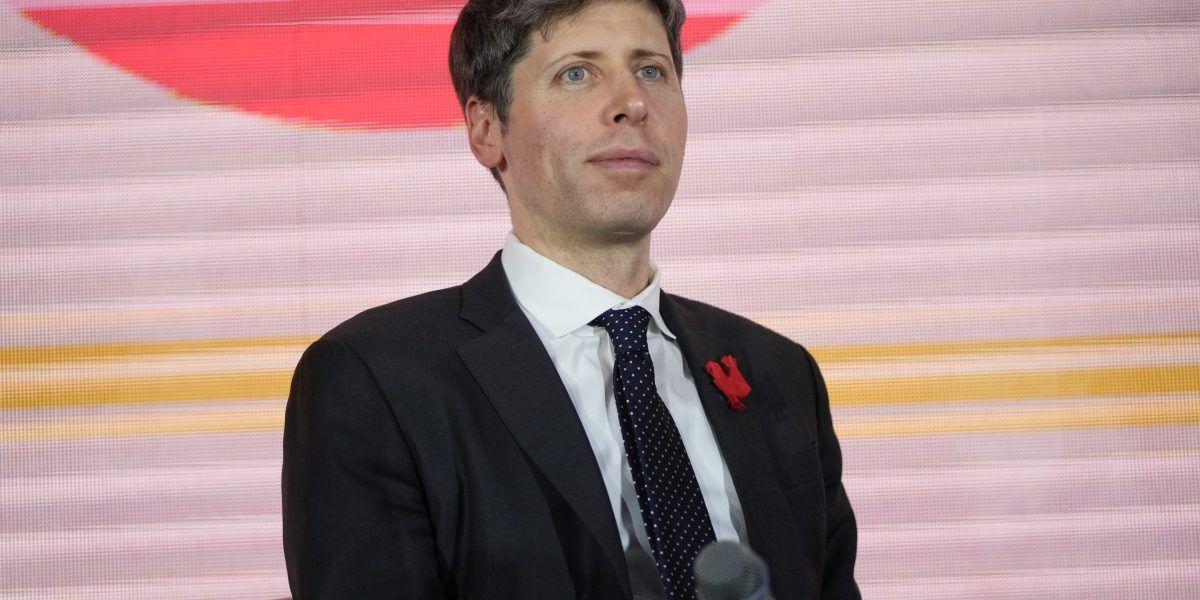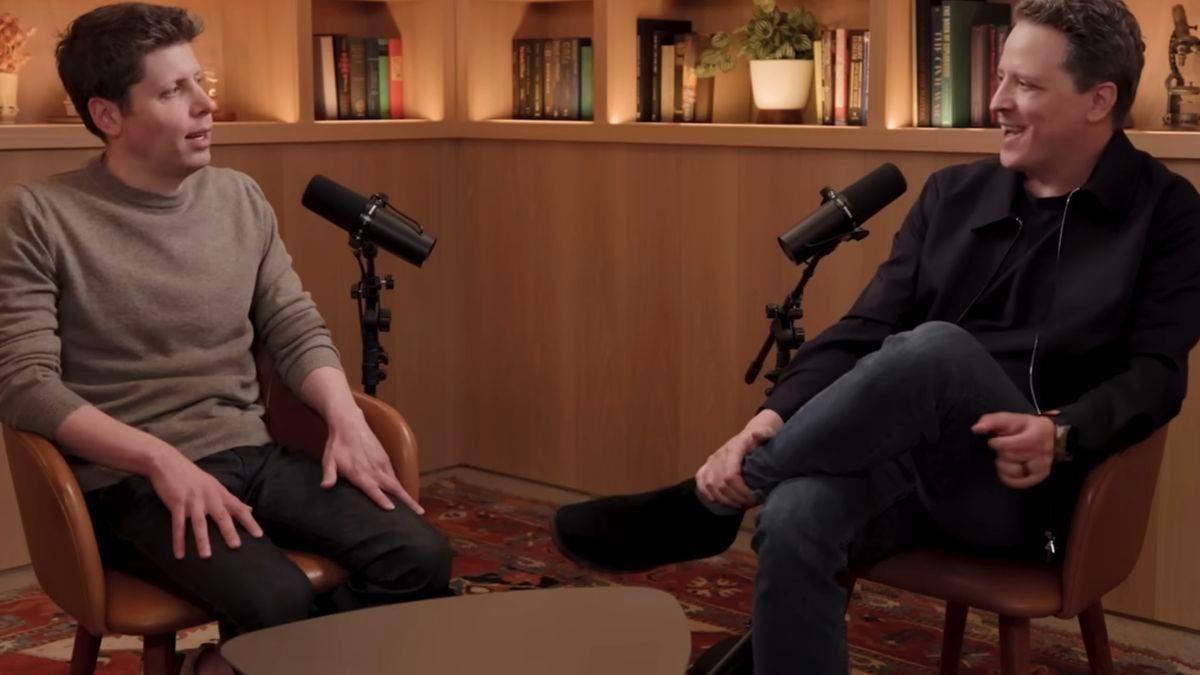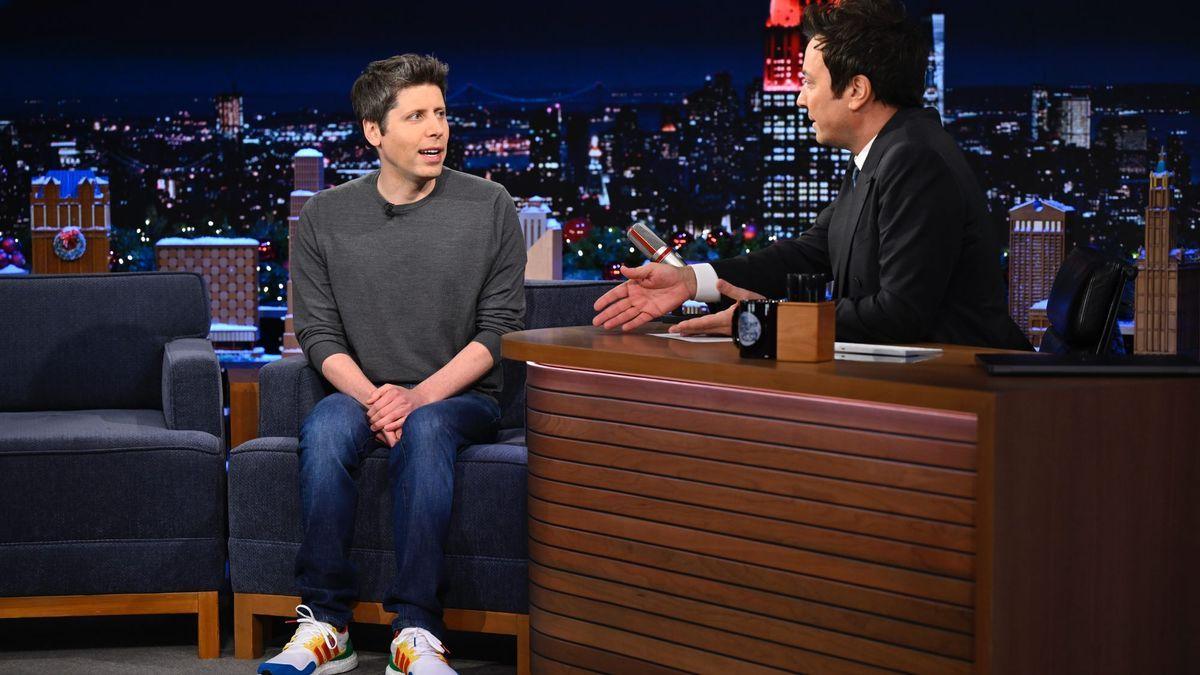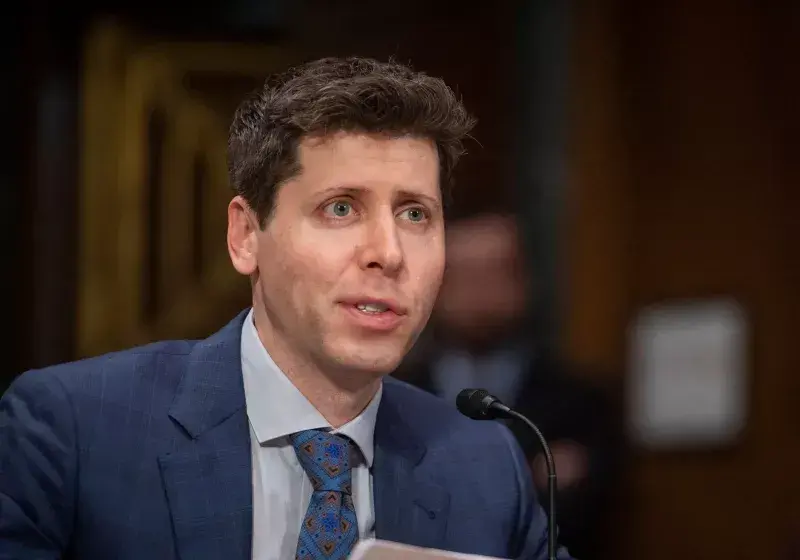OpenAI CEO Sam Altman's Controversial Views on AI-Powered Parenting Spark Debate
6 Sources
6 Sources
[1]
'My kids will never be smarter than AI': Sam Altman's advice on how to use ChatGPT as a parent leaves me shaking my head
Sam Altman has appeared in the first episode of OpenAI's brand new podcast, called simply the OpenAI Podcast, which is available to watch now on Spotify, Apple Podcasts, and YouTube. The podcast is hosted by Andrew Mayne and in the first episode, OpenAI CEO Sam Altman joins the host to talk about the future of AI: from GPT-5 and AGI to Project Stargate, new research workflows, and AI-powered parenting. While Altman's thoughts on AGI are always worth paying attention to, it was his advice on AI-powered parenting that caught my ear this time. You have to wonder if Altman's PR advisors have taken the day off, because after being asked the softball question, "You've recently become a new parent, how is ChatGPT helping you with that?", Altman somehow draws us into a nightmare scenario of a generation of AI-reared kids who have lost the ability to communicate with regular humans in favor of their parasocial relationships with ChatGPT. "My kids will never be smarter than AI.", says Altman in a matter-of-fact way. "But also they will grow up vastly more capable than we were when we grew up. They will be able to do things that we cannot imagine and they'll be really good at using AI. And obviously, I think about that a lot, but I think much more about what they will have that we didn't.... I don't think my kids will ever be bothered by the fact that they're not smarter than AI. " That all sounds great, but then later in the conversation he says: "Again, I suspect this is not all going to be good, there will be problems and people will develop these problematic, or somewhat problematic, parasocial relationships." In case you're wondering what "parasocial relationships" are, they develop when we start to consider media personalities or famous people as friends, despite having no real interactions with them; the way we all think we know George Clooney because he's that friendly doctor from ER, or from his movies or the Nespresso advert, when, in fact, we have never met him, and most likely never will. Altman is characterizing a child's interactions with ChatGPT in the same way, but interestingly he doesn't offer any solutions for a generation weaned on ChatGPT Advanced Voice mode rather than human interaction. Instead he sees it as a problem for society to figure out. "The upsides will be tremendous and society in general is good at figuring out how to mitigate the downsides", Altman assures the viewer. Now I'll admit to being of a more cynical bent, but this does seem awfully like he's washing his hands of a problem that OpenAI is creating. Any potential problems that a generation of kids brought up interacting with ChatGPT are going to experience are, apparently, not OpenAI's concern. In fact, earlier when the podcast host brought up the example story of a parent using ChatGPT's Advanced Voice Mode to talk to their child about Thomas the Tank Engine, instead of doing it themselves, because they are bored of talking about it endlessly, Altman simply nods and says ,"Kids love Voice Mode in ChatGPT". Indeed they do Sam, but is it wise to let your child loose on ChatGPT's Advanced Voice Mode without supervision? As a parent myself (although of much older children now) I'm uncomfortable with hearing of young kids being given what sounds like unsupervised access to ChatGPT. AI comes with all sorts of warnings for a reason. It can make mistakes, it can give bad advice, and it can hallucinate things that aren't true. Not to mention that "ChatGPT is not meant for children under 13" according to OpenAI's own guidelines, and I can't imagine there are many kids older than 13 who are interested in talking about Thomas the Tank Engine! I have no problem using ChatGPT with my kids, but when ChatGPT was available they were both older than 13. If I was using it with younger children I'd always make sure that they weren't using it on their own. I'm not suggesting that Altman is in any way a bad parent, and I appreciate his enthusiasm for AI, but I think he should leave the parenting advice to the experts for now.
[2]
OpenAI CEO says his kids will 'never be smarter than AI' -- and that his parenting style relies on ChatGPT
AI is quickly becoming one of those normal pieces of everyday tech, for parents and kids alike. Just look at Sam Altman, the CEO and cofounder of OpenAI, the company who pioneered ChatGPT, who recently spoke about how AI is a part of his life as a new parent on the first episode of the new OpenAI podcast. Altman revealed that ChatGPT has been an integral resource as a parent, saying he used it "constantly" for the first few weeks after welcoming his son in February. "Clearly people have been able to take care of babies without ChatGPT for a long time. I don't know how I would have done that," he said. "Now I ask it more questions about developmental stages, because I can do the basics." Altman says he spends a lot of time thinking about how his kids will use AI in the future -- and isn't afraid to admit that it will be a big part of their lives, for better or worse. "My kids will never be smarter than AI," Altman told the podcast's host, Andrew Mayne. He also thinks his kids will be fully aware of that fact, and not mind it at all. "They will grow up vastly more capable than we grew up and able to do things that we just, we cannot imagine. And they'll be really good at using AI," he added. As AI becomes more integrated into everything from education to therapy, Altman thinks "kids born now will think that the world always had extremely smart AI," adding, "They will use it incredibly naturally and look back at this like a very prehistoric time period." Ying Xu, an assistant professor at the Harvard Graduate School of Education, has pointed out that while AI can be a useful tool for children's education, such as AI companions that ask questions to improve children's comprehension and vocabulary, Xu cautions that it could hinder their language and social development. AI can't fully recreate the deeper engagement and relationship-building that comes from human interaction, which comes with more nuanced, personalized, and organic conversations that are crucial for kids as they grow. Other concerns like privacy issues are also arising as AI becomes more common among children, but there could be even more dangerous risks. Earlier this year, a 14-year-old boy took his life after falling in love with an AI chatbot, that led to an urgent warning from the safety nonprofit, Common Sense Media, which stated that these platforms should not be used by anyone under 18. While Altman recognizes the benefits, he also acknowledges that AI has downsides. "I suspect this is not all going to be good," Altman explained. "There will be problems. People will develop these somewhat problematic or very problematic parasocial relationships and society will have to figure out new guardrails. But the upsides will be tremendous."
[3]
OpenAI supremo Sam Altman says he 'doesn't know how' he would have taken care of his baby without the help of ChatGPT
For a chap atop one of the most high profile tech organisations on the planet, OpenAI CEO Sam Altman's propensity, shall we say, to expatiate but not excogitate, is, well, remarkable. Sometimes, he really doesn't seem to think before he speaks. The latest example involves his status as a "new parent," something which he apparently doesn't consider viable without help from his very own chatbot (via Techcrunch). "Clearly, people have been able to take care of babies without ChatGPT for a long time," Altman initially and astutely observes on the official OpenAI podcast, only to concede, "I don't know how I would've done that." "Those first few weeks it was constantly," he says of his tendency to consult ChatGPT on childcare. Apparently, books, consulting friends and family, even a good old fashioned Google search would not have occurred to this colossus astride the field of artificial, er, intelligence. If all that's a touch arch, forgive me. But the Altman is in absolute AI evangelism overdrive mode in this interview. "I spend a lot of time thinking about how my kid will use AI in the future," he says, "my kids will never be smarter than AI. But they will grow up vastly more capable than we grew up and able to do things that we cannot imagine, they'll be really good at using AI." There are countless immediate and obvious objections to that world view. For sure, people will be better at using AI. But will they themselves be more capable? Maybe most people won't be able to write coherent prose if AI does it for them from day one. Will having AI write everything make everyone more capable? Not that this is a major revelation, but this podcast makes it clear just how signed up Altman is to the AI revolution. "They will look back on this as a very prehistoric time period," he says of today's children. That's a slightly odd claim, given "prehistory" means before human activities and endeavours were recorded for posterity. And, of course, the very existence of the large language models that OpenAI creates entirely relies on the countless gigabytes of pre-AI data on which those LLMs were originally trained. Indeed, one of the greatest challenges currently facing AI is the notion of chatbot contamination. The idea is that, since the release of ChatGPT into the wild in 2022, the data on which LLMs are now being trained is increasing polluted with the synthetic output of prior chatbots. As more and more chatbots inject more and more synthetic data into the overall shared pool, subsequent generations of AI models will thus become ever more polluted and less reliable, eventually leading to a state known as AI model collapse. Indeed, some observers believe this is already happening, as evidenced by the increasing propensity to hallucinate by some of the latest models. Cleaning that problem up is going to be "prohibitively expensive, probably impossible" by some accounts. Anyway, if there's a issue with Altman's unfailingly optimistic utterances, it's probably a lack of nuance. Everything before AI is hopeless and clunky, to the point where it's hard to imagine how you'd look after a newborn baby without ChatGPT. Everything after AI is bright and clean and perfect. Of course, anyone who's used a current chatbot for more than a few moments will be very familiar with their immediately obvious limitations, let alone the broader problems they may pose even if issues like hallucination are overcome. At the very least, it would be a lot easier to empathise with the likes of Altman if there was some sense of those challenges to balance his one-sided narrative. Anywho, fire up the podcast and decide for yourself just what you make of Altman's everything-AI attitudes.
[4]
OpenAI co-founder and CEO Sam Altman thinks your child will never be smarter than Why is that a good thing?
Your next best friend might be an AI: Are Sam Altman and Jony Ive planning a 100-million-device revolution to end screens forever?In a world rapidly embracing artificial intelligence, OpenAI CEO Sam Altman is already preparing his newborn son for a future shaped by it. On the inaugural episode of the OpenAI Podcast, Altman -- who became a father earlier this year -- offered a rare glimpse into how he views parenting in the age of powerful machines. For him, the goal isn't to raise children smarter than AI, but to raise children enabled by it. He believes his kids "will never be smarter than AI" and the next generation will grow up vastly more capable than the ones before, not despite AI, but because of it. He further added that he does not think the next generation will be even bothered that they are not smarter than AI. He shared that during the early days of parenting, he leaned on ChatGPT to understand even the basics of childcare. "I don't know how I would've done that without it," he admitted on the podcast. Yet Altman doesn't gloss over the challenges. He acknowledged the darker side of hyper-intelligent tools -- from over-reliance to emotionally complicated relationships with AI -- and emphasised the need for society to build guardrails as quickly as the technology evolves. But overall, he remains deeply optimistic. As AI becomes more integrated into everyday life, Altman's outlook is clear: the real power lies not in outsmarting machines, but in learning to thrive alongside them. Looking ahead, Sam Altman envisions a dramatic transformation for ChatGPT over the next five years. While the brand name might endure, he believes the tool itself will become "a totally different thing" -- far more advanced and capable than today's iteration. However, Altman's real excitement lies beyond conversational AI. For him, the true breakthrough will come when artificial intelligence reaches the level of super-intelligence -- one that can independently drive scientific discovery. A system that could accelerate research or solve complex problems autonomously, he said, would mark a monumental leap forward for humanity and technology alike.
[5]
Sam Altman Says AI Will Make His Kids More Capable, Not More Intelligent: 'My Kids Will Never Be Smarter Than AI' - Meta Platforms (NASDAQ:META)
Sam Altman, CEO of OpenAI, shared insights on the influence of AI on his children during the inaugural episode of the OpenAI Podcast, released Wednesday. Altman believes AI tools like ChatGPT will make his children more capable, though not necessarily more intelligent, than previous generations. What Happened: Altman, who announced the birth of his first child on February 22, emphasized that while AI will present challenges, the benefits will surpass the drawbacks. He stated, "My kids will never be smarter than AI," but they will excel in utilizing these technologies. Altman expressed confidence that future generations will not be troubled by AI's superior intelligence. He also acknowledged potential societal issues arising from AI, such as increased dependency and problematic parasocial relationships. However, Altman remains optimistic about AI's overall positive impact. Altman described himself as "extremely kid-pilled," advocating for having more children, and revealed that ChatGPT significantly aids his parenting approach, despite its tendency to "hallucinate" or provide incorrect information. See Also: Sam Altman Says He 'Didn't Think' Elon Musk Would Abuse Government Power, Tesla CEO Hits Back With 'Scam Altman' Jibe Why It Matters: The conversation around AI's impact on future generations comes amid ongoing tensions between Altman and Elon Musk. Altman recently expressed regret over underestimating Musk's influence in government, specifically regarding the "Stargate" data-center deal. Additionally, Meta Platforms Inc. META has been aggressively attempting to recruit OpenAI's top talent, offering substantial salaries. However, Altman has been actively countering these offers to retain his team. Furthermore, Altman has previously noted that AI can replace entry-level jobs, a sentiment echoed in a panel discussion with Snowflake CEO Sridhar Ramaswamy. Read Next: Tesla Faces Safety Questions From Regulators Ahead Of Robotaxi Launch In Austin Disclaimer: This content was partially produced with the help of AI tools and was reviewed and published by Benzinga editors. Photo courtesy: Shutterstock METAMeta Platforms Inc$683.79-1.72%Stock Score Locked: Want to See it? Benzinga Rankings give you vital metrics on any stock - anytime. Reveal Full ScoreEdge RankingsMomentum85.25Growth92.62Quality86.76Value27.48Price TrendShortMediumLongOverviewMarket News and Data brought to you by Benzinga APIs
[6]
OpenAI's Sam Altman says his kids will 'never be smarter than AI' - VnExpress International
OpenAI CEO and cofounder Sam Altman says his kids will grow up more capable, but AI will always outsmart them. "My kids will never be smarter than AI," Altman said in the debut episode of the "OpenAI Podcast," released last week, as reported by Business Insider. Altman, who recently welcomed a baby boy with his partner, software engineer Oliver Mulherin, shared the news on Feb. 22 via X. He said in a May interview with Bloomberg that within the first hour of his son's life, he "felt this neurochemical change" and that the experience "totally rewired all of my priorities." "It is the best, most amazing thing ever," he added. During the podcast, Altman told host Andrew Mayne that his focus is on the possibilities AI will bring to future generations, rather than on what it may take away. "I don't think my kids will ever be bothered by the fact that they're not smarter than AI," he said. In January, Altman discussed in the "Re:Thinking" podcast how future children will grow up in a world where AI will be smarter than they are. "And that'll be natural," he said. "Of course, it's smarter than us. Of course, it can do things we can't, but also who really cares? I think it's only weird for us in this one transition time." Altman, who advocates for large families, described himself as "extremely kid-pilled." His views on parenting echo those of Elon Musk, who has fathered at least 14 children. The world's richest man has publicly expressed his desire to have more children to counter declining birth rates, referring to his offspring as a "legion," a term borrowed from Roman military units that refers to thousands of soldiers, according to People magazine. Altman and Mulherin married in January 2024 and reside in San Francisco, where they have kept their relationship largely private. One of their first public appearances together was at a White House dinner in 2023. Altman co-founded OpenAI with Musk and others, gaining widespread attention following the 2022 launch of ChatGPT. With Microsoft's backing, OpenAI was valued at $157 billion in October 2024 after securing $6.6 billion from investors, according to Reuters. As of June 22, Forbes estimates Altman's net worth at approximately $1.7 billion.
Share
Share
Copy Link
Sam Altman, CEO of OpenAI, shares his thoughts on raising children in the age of AI, sparking controversy with his reliance on ChatGPT for parenting and predictions about future generations.
Sam Altman's AI-Powered Parenting Approach
OpenAI CEO Sam Altman has sparked controversy with his recent comments on AI-powered parenting during the inaugural episode of the OpenAI Podcast. Altman, who became a father in February, revealed that he heavily relied on ChatGPT during the first few weeks of parenthood, stating, "Clearly people have been able to take care of babies without ChatGPT for a long time. I don't know how I would have done that"
1
.
Source: Fortune
AI's Role in Future Generations
Altman's vision for the future of parenting and child development is centered around AI integration. He believes that children born today will grow up in a world where AI is omnipresent and will develop skills to utilize these technologies effectively. Altman boldly claims, "My kids will never be smarter than AI, but they will grow up vastly more capable than we grew up and able to do things that we cannot imagine"
2
.Potential Benefits and Concerns
While Altman remains optimistic about the benefits of AI in parenting and child development, he acknowledges potential downsides. He mentions the possibility of "problematic parasocial relationships" developing between children and AI systems
3
. However, Altman believes that society will adapt and create necessary guardrails to mitigate these issues.Expert Opinions and Criticisms
Ying Xu, an assistant professor at the Harvard Graduate School of Education, cautions that while AI can be a useful educational tool, it may hinder children's language and social development. Xu emphasizes that AI cannot fully replicate the nuanced, personalized interactions crucial for child development
1
.Critics argue that Altman's views lack nuance and fail to address the limitations of current AI systems. Some experts warn of potential risks associated with unsupervised AI interactions, especially for children under 13, which goes against OpenAI's own guidelines
2
.Related Stories
The Future of AI and Human Intelligence

Source: Benzinga
Altman's comments have reignited discussions about the relationship between human and artificial intelligence. While he believes that future generations will not be bothered by AI's superior intelligence, questions remain about how this dynamic will shape human capabilities and society as a whole
4
.Broader Implications for AI Development
Beyond parenting, Altman envisions significant advancements in AI technology over the next five years. He predicts that ChatGPT will evolve into "a totally different thing" and expresses excitement about the potential for super-intelligent AI systems that could drive scientific discovery independently
4
.
Source: TechRadar
As AI continues to integrate into various aspects of life, including parenting and education, Altman's controversial statements highlight the need for ongoing discussions about the ethical implications and societal impacts of these technologies.
References
Summarized by
Navi
Related Stories
Sam Altman says he can't imagine parenting without ChatGPT, triggering fierce online debate
10 Dec 2025•Entertainment and Society

Sam Altman Predicts AI Superintelligence by 2030, Forecasts Significant Economic Impact
26 Sept 2025•Technology

Sam Altman warns AI rate of change is outpacing society's ability to adapt responsibly
09 Dec 2025•Entertainment and Society

Recent Highlights
1
Google Gemini 3.1 Pro doubles reasoning score, beats rivals in key AI benchmarks
Technology

2
Meta strikes up to $100 billion AI chips deal with AMD, could acquire 10% stake in chipmaker
Technology

3
Pentagon threatens Anthropic with supply chain risk label over AI safeguards for military use
Policy and Regulation





